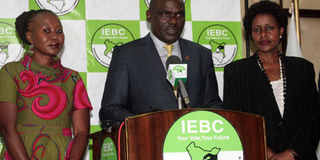IEBC must create confidence among all parties ahead of August general election

Independent Electoral and Boundaries Commission Chairman Wafula Chebukati (centre) with Commissioner Roselyne Akombe (left) and Vice-Chairperson Consolata Maina at the commission's office at Anniversary Towers in Nairobi on March 24, 2017. PHOTO | EVANS HABIL | NATION MEDIA GROUP
What you need to know:
- President Kenyatta’s expression of confidence in IEBC as a poll umpire is a sign of confidence in the outcome of August’s election.
- Mr Musyoka’s lack of confidence in the polls agency is a diviner of lack of confidence in the outcome of the election.
- IEBC will win public trust if its work is professional, transparent, and impartial and its outcomes accurate.
In his State of the Nation address last month, President Kenyatta said he “had full confidence” that the newly-installed Independent Electoral and Boundaries Commission (IEBC) team was “capable of delivering a credible election”.
A week later, Mr Kalonzo Musyoka when addressing a rally in Mathare in Nairobi, said the emergent National Super Alliance (Nasa) would deploy parallel vote tabulating (PVT) to safeguard its presidential ballot tally.
Two visions emerged. The President’s and therefore, his Jubilee Party’s, confidence and support, and presidential hopeful Musyoka’s and Nasa’s, lack of confidence or support, for IEBC.
President Kenyatta’s expression of confidence in IEBC as a poll umpire is a sign of confidence in the outcome of August’s election. Mr Musyoka’s lack of confidence in the polls agency points to lack of confidence in the outcome of the election.
These differences matter. The political background against which an election is held has a bearing on how its outcome is received and held. If Nasa cannot trust IEBC’s vote counts, it cannot have trust in the electoral process the agency runs.
IEBC’s job is to count every vote and to make every vote count. It can only do that and be seen to do so if there is stakeholder and public confidence in the electoral process of which elections is a part and of which tallying is the tail-end.
According to the Kofi Annan Foundation, poll umpires win public trust if their work is professional, transparent, and impartial and its outcomes accurate. This entails, inter alia, regular communication and consultation with stakeholders, dissemination of information at and on every stage and development, and openness in handling poll results.
These attributes bestow integrity and credibility on a polls arbiter. If IEBC fails on one, it lays to waste the entire process that it watches. And, just like the outcome of an election, IEBC’S work is impacted by the political background against which it is carried out.
So, 17 weeks away from the next General Election, the pronouncements above mean Jubilee’s supporters are more likely to troop to the polling booths to vote where Nasa’s may be in two minds.
This because when Nasa’s leaders expressly declare lack of confidence in IEBC, they cast a vote against the agency’s competence and risk demotivating their supporters into not voting. Why vote, they may ask, when the fix is in?
If Nasa adopts PVT, then, it must remember that only IEBC can legally count votes, tally them and confirm them to be official at station, ward, constituency and national levels.
Nasa’s counts, tallies or results will not be official. Because Mr Musyoka referenced Ghana, where PVT, also known as Quick Count, has worked, let us have a look. PVT was used in Ghana in 2000, 2008 and last December.
It was not used by competing political parties, but by the non-partisan, non-governmental Coalition of Domestic Election Observers (CODEO), backed by its teams of trained statisticians and poll observers and administrators.
CODEO observes the counting and tallying of votes and files reports on the same in real time as well as the official vote count by the Electoral Commission of Ghana (EC) to its central election observation point using text messaging. And, its PVT has dealt with only sampled, and not all, polling stations.
Last and vitally, Nasa will require great discipline and only publicly declare its tallies to independently verify IEBC’s results. When Ghana’s New Patriotic Party (NPP) last year declared its candidate was leading before EC did, it caused a storm and tension. A peace watchdog condemned the move as an illegality and recipe for chaos.
By the way, Kenya’s poll agents always observe the voting and counting of ballots at polling stations; collect official polling station results and independently tabulate and transmit them to their Hqs. This is also PVT and was used by NPP in making its ill-advised call.
For Kenyans, the stakes could not be higher. One, Nasa and Jubilee are in conflict over IEBC. Two, August’s General Election should approve or disapprove Jubilee’s governance. Three, the plebiscite should give Kenyans a voice in choosing their governance and governors.
Last, Kenya’s elections are winner-take-all events, with no consolation prizes for losers. This, the Kofi Annan Foundation says, harbours violence. That's reason enough for IEBC to take charge and expeditiously bring together all stakeholders to discuss, agree and sign on the way forward to a free and fair General Election and, crucially, peaceful resolution of political competition.





